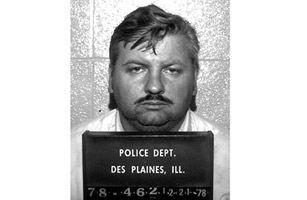
The warning signs were there: the arrest for sodomy with a minor; another sexual offense with a child; the strange smell, like dead things, in his house. But John Wayne Gacy was also an upstanding citizen: he helped out the neighbors, he was the chaplain of the Jaycees, he dressed up as roly-poly Pogo the Clown to entertain children. But when police came asking questions in December 1978, Gacy started confessing. And so the cops looked in the house's 40-ft. crawl space, beneath the garage and under the house. They found the bodies and remains of 28 young men and boys; Gacy said there were four others that he had thrown into the river. By the end of the year, police had practically torn the house down in their search. There was no question that Gacy would be found guilty; and a jury took barely an hour to come to that decision. He was sentenced to death, under new guidelines that would make sure the penalty was not "cruel and unusual" and therefore within constitutional bounds. But Gacy's execution by lethal injection in 1994 would reopen that question; instead of a five-minute procedure, the process took 18 and Gacy was clearly struggling as he perished. The critics asked: Was this cruel and unusual? His victims' families were unanimous: so was Gacy.
From the Archive:
"I Do Horrible, Rotten Things"